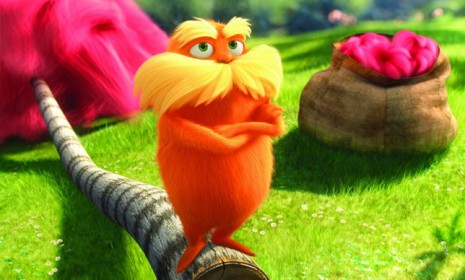Does The Lorax do Dr. Seuss justice?
A grouchy orange critter still speaks for the trees — but, in other ways, the new film adaptation undermines Seuss' environmental message

A free daily email with the biggest news stories of the day – and the best features from TheWeek.com
You are now subscribed
Your newsletter sign-up was successful
Theodor Geisel, better known as Dr. Seuss, would have turned 108 on Friday — the same day the colorful film adaptation of The Lorax, one of his most beloved and controversial books, hits theaters. (Watch the trailer below.) In some ways, the animated film is the same cautionary tale about the dangers of industrialism that caused a stir 40 years ago (and continues to spark heated debate today). In other ways, it's quite different with additional characters, romantic subplots, and original songs injected to fill out the 95-minute film. Among the new twists: Ted, a 12-year-old boy voiced by Zac Efron, lives in a manufactured town called Thneedville, and when his crush, voiced by Taylor Swift, expresses her desire to see a real tree, Ted embarks on an odyssey to find the seemingly mythical plant. He soon encounters the Once-ler, an enterprising businessman responsible for the destruction of the trees, and hears the tale of the Lorax, the mustachioed orange critter who warns of nature's demise at the hand of greed. Does expanding Seuss' tale blunt his original, pointed message?
Dr. Seuss would be proud: Seuss' 45-page book needed padding to become a feature film, says Linda Barnard at The Toronto Star. Thankfully, the movie still "packs a visual punch and a worthy message." The romantic subplot is necessary to set the action in the motion, while the zippy score, Betty White's one-liner-dishing grandma, and a bevy of new supporting characters are all entertaining new elements. More importantly, Seuss would have liked it. "The central theme doesn't get lost amid the CGI trickery and fancy 3D."
"Dr. Seuss' The Lorax review: Seuss story put to good use"
The Week
Escape your echo chamber. Get the facts behind the news, plus analysis from multiple perspectives.

Sign up for The Week's Free Newsletters
From our morning news briefing to a weekly Good News Newsletter, get the best of The Week delivered directly to your inbox.
From our morning news briefing to a weekly Good News Newsletter, get the best of The Week delivered directly to your inbox.
Actually, Seuss would be embarrassed: "How do you expand a 10-minute read into a 90-minute movie?" says Tasha Robinson at The A.V. Club. As The Lorax proves, you don't. "The blandness of the new material" highlights the perils of turning a Seuss story into a feature-length film in the first place. The Lorax is a "dark story with a heavy message," but here it's "transformed into a harmless, pretty confection." In this "defanging" of the serious-minded fable, "the filmmakers have done Seuss as much of a disrespectful disservice as if they'd laid on the fart gags."
The film makes the book's point — unintentionally: The film's relationship to the book, says A.O. Scott at The New York Times, "is precisely that of the synthetic trees that line the streets of Thneedville to the organic Truffulas they have displaced." The film is overly commercialized, skimps on the environmentalist substance, and seems to exist purely as a marketing gimmick. The filmmakers have taken the book's dark lesson and "wrapped [it] in gaudy, familiar business and festooned it with grim, forced cheer." Of course, "there is an obvious metaphor here, but the movie is blind to it."
"How the Grinch stole the Lorax"
A free daily email with the biggest news stories of the day – and the best features from TheWeek.com
-
 6 exquisite homes with vast acreage
6 exquisite homes with vast acreageFeature Featuring an off-the-grid contemporary home in New Mexico and lakefront farmhouse in Massachusetts
-
 Film reviews: ‘Wuthering Heights,’ ‘Good Luck, Have Fun, Don’t Die,’ and ‘Sirat’
Film reviews: ‘Wuthering Heights,’ ‘Good Luck, Have Fun, Don’t Die,’ and ‘Sirat’Feature An inconvenient love torments a would-be couple, a gonzo time traveler seeks to save humanity from AI, and a father’s desperate search goes deeply sideways
-
 Political cartoons for February 16
Political cartoons for February 16Cartoons Monday’s political cartoons include President's Day, a valentine from the Epstein files, and more